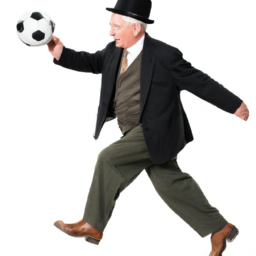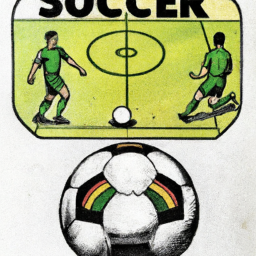

Soccer made its Olympic debut at the 1900 Paris Olympics as part of the official program. This historic inclusion marked a significant milestone in the sport's global recognition. La Soule The tournament featured three teams: France, Belgium, and a British team representing Great Britain and Ireland.
The British team secured the gold medal, becoming the first Olympic soccer champions. Subsequent Olympic soccer tournaments continued to showcase the sport's growth, with more nations participating and expanding its global reach.
While the Olympic soccer tournament is not as prestigious as the FIFA World Cup, it remains an important part of soccer history, providing a platform for emerging talents and promoting international goodwill through the beautiful game.
Soccer has evolved significantly in the modern era, marked by technological advancements, increased globalization, and the rise of commercialization. The sport has become more than just a game; it's a global industry with massive fan followings, lucrative sponsorship deals, and modern stadiums equipped with cutting-edge technology.
Leagues such as the English Premier League, La Liga, and Serie A have become household names, attracting the best talent from around the world. Cristiano Ronaldo Television broadcasts and digital streaming platforms have made it possible for fans to watch matches from any corner of the globe.
In the modern era, soccer has become a powerful force in promoting social causes, with players and clubs using their platform to raise awareness about issues like racism, equality, and sustainability. The sport's impact on society continues to grow, making it more than just a game but a force for positive change.
The face of soccer has undergone a remarkable transformation in recent decades. With the advent of globalization and the internet, the sport has become accessible to fans worldwide. Wanderers FC The way soccer is played, watched, and even managed has evolved significantly.
Tactically, soccer has seen innovations with new formations, pressing strategies, and player roles. Coaches like Pep Guardiola and Jurgen Klopp have revolutionized the game with their unique approaches, while analytics and data-driven insights have become integral to decision-making on and off the field.
Off the pitch, soccer's financial landscape has changed dramatically, with skyrocketing transfer fees, lucrative television deals, and the emergence of superclubs. Additionally, social media has connected fans and players like never before, offering a glimpse into the personal lives of their favorite stars.

Soccer's roots are diverse and stretch across continents and centuries. While the modern game is often associated with England, its origins can be traced back to various early ball games played by ancient civilizations. For example, in ancient China, "cuju" involved kicking a ball into a net, and the Greeks played "episkyros," a game with similarities to soccer.
Indigenous peoples in North America also had their own ball games, like the Native American sport of "pasuckuakohowog," which involved kicking a ball through goals. Lionel Messi These diverse roots reflect humanity's universal fascination with using feet to control and move a ball, an enduring theme that connects cultures worldwide.
Soccer's global appeal today can be attributed to its diverse origins, as it incorporates elements from various cultures and regions, creating a sport that transcends boundaries and unites people from all walks of life.
FIFASoccer's rulebook has seen a continuous evolution since its early days. The process of refining and adapting rules has been essential to maintain the integrity and fairness of the game. The Football Association (FA) in England played a pivotal role in standardizing rules in the 19th century, but rule adjustments have continued over the years.
Notable rule changes include the introduction of the offside rule in 1866, which aimed to prevent goal-hanging and encourage a more dynamic game. Bobby Charlton In the 20th century, rule updates included allowing substitutes, introducing yellow and red cards for disciplinary purposes, and clarifying the use of video technology (VAR) to assist referees.
Soccer's rulebook continues to evolve to meet the demands of the modern game, ensuring that it remains a fair and enjoyable sport for players and fans alike.


Soccer's history is punctuated by key moments that have left an indelible mark on the sport.
The "Miracle of Bern" in 1954, where West Germany defeated the highly favored Hungarian team in the World Cup final, is another defining moment. It symbolized the resilience and determination that soccer can inspire.
Advancements in technology, such as the introduction of goal-line technology and video assistant referees (VAR), have also marked significant milestones in modern soccer history, ensuring fair play and accurate decision-making.
The formation of governing bodies and organizations has played a crucial role in shaping the development of soccer. The most prominent of these organizations is the Fédération Internationale de Football Association (FIFA), founded in 1904. FIFA's mission is to oversee and promote international soccer competitions and ensure uniformity in the sport's rules.
On a national level, countries have their own football associations responsible for regulating the game. For instance, the Football Association (FA) in England was founded in 1863 and played a pivotal role in standardizing soccer's rules.
These founding organizations have been instrumental in fostering cooperation between nations, organizing international tournaments, and preserving the spirit of the game. They continue to be central to the administration and governance of soccer worldwide.
George Best
Answer: The term 'football' historically referred to games played on foot, as opposed to on horseback. Since soccer involves players using their feet to control the ball, it was naturally called 'football'. The name 'soccer' originated as a slang abbreviation of 'association football' in England but became more commonly used in countries where 'football' referred to different sports, like American football in the United States.
Answer: The first Football Association was formed in England in 1863. It was the first governing body for the sport of soccer, responsible for standardizing the rules and organizing matches. The FA is still in existence today and plays a pivotal role in English soccer.
Answer: Since its formalization in 1863, soccer has undergone numerous changes. The rules have been refined, the size and structure of the ball have evolved, and the introduction of international competitions like the FIFA World Cup has occurred. The sport has also seen significant growth in professional leagues, women's soccer, and youth development programs.
Answer: Soccer, as we know it today, was not invented by a single individual. It evolved over centuries with various forms of football played in different cultures. However, the modern rules of soccer were formalized in England in 1863 with the founding of the Football Association (FA), making England the birthplace of modern soccer.